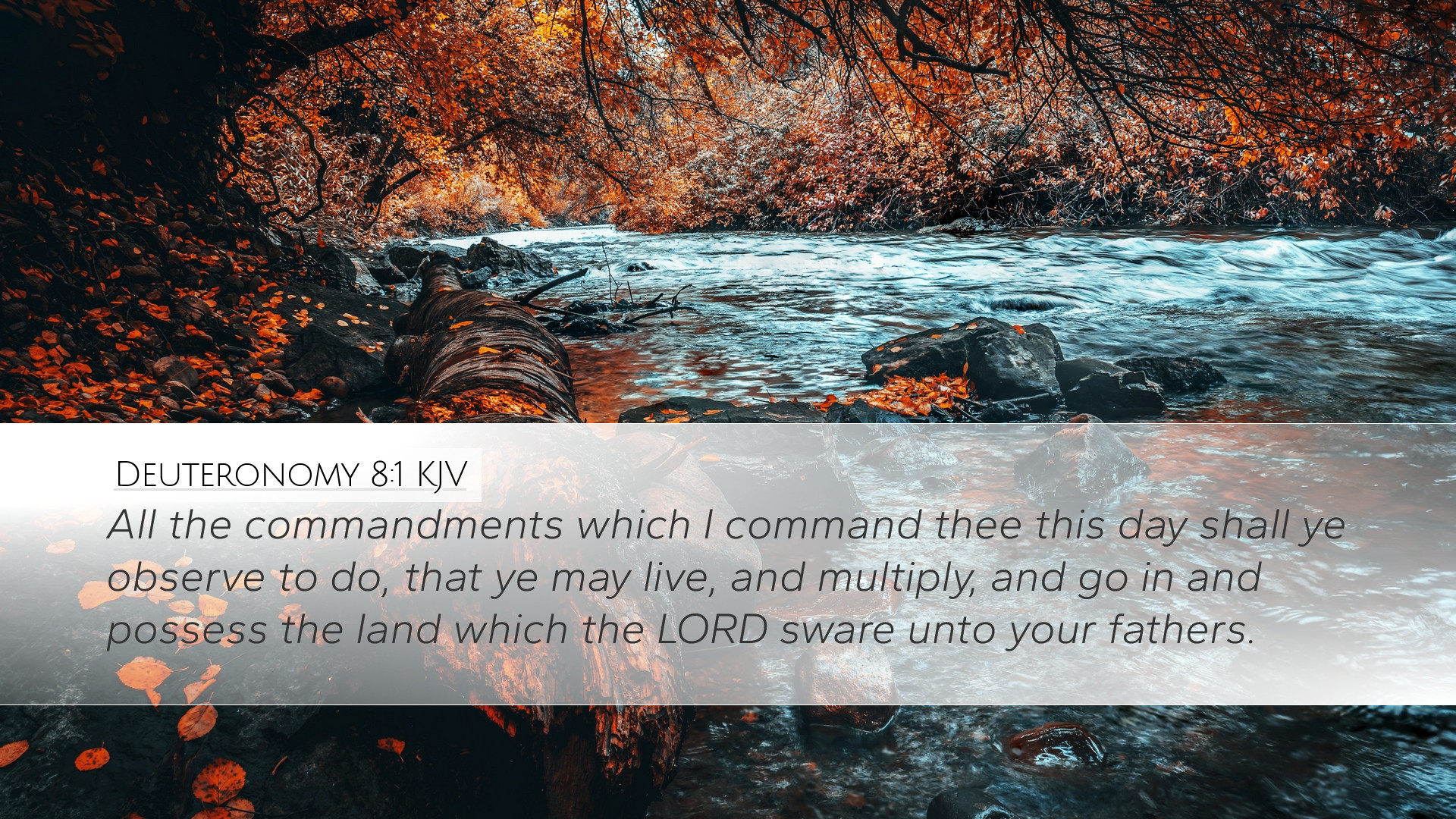Deuteronomy 8:1 Commentary
Text of the Verse: "All the commandments which I command thee this day shall ye observe to do, that ye may live, and multiply, and go in and possess the land which the LORD sware unto your fathers."
Introduction
The verse under examination is pivotal in the book of Deuteronomy where Moses addresses the Israelites. It encapsulates the significance of obedience to God's commandments, offering a blend of spiritual, moral, and practical implications that resonate through theology, history, and daily living. The verses serve as a reminder of covenant obligations and the blessings tied to adherence.
Thematic Analysis
This verse introduces several key themes:
- Obedience: The imperative to observe all commandments is foundational in establishing a relationship with God.
- Blessings of Obedience: The rewards of living according to God’s commandments are succinctly articulated — life, multiplication, and possession of the Promised Land.
- Covenant Promise: It highlights God's faithfulness in fulfilling His promises made to the ancestors of Israel.
Commentary Insights
Renowned commentaries provide a wealth of insights into this verse:
Matthew Henry's Commentary
Henry emphasizes the necessity of “diligent observance.” He interprets the command to observe all the commandments not merely as a legalistic endeavor but as a means to secure blessings from God. In his view, the act of doing always accompanies the knowledge of God’s laws, reinforcing the holistic approach to faith that is vital for spiritual vitality. He notes that the result of obeying God’s commandments is multifaceted: it leads to life, prosperity, and security in the land, echoing the deep connection between ethical living and divine favor.
Albert Barnes' Notes on the Bible
Barnes elucidates the significance of “shall ye observe to do.” He underscores that the observance is not a passive stance but an active participation in the covenant relationship with God. Barnes reflects on the consequences of disobedience versus obedience, asserting that the former leads to despair and ruin, while the latter leads to blessings, including the fruitful expansion of the nation and the inheritance of the land promised to their forefathers. He notes the phrase “which the LORD sware” as a critical reminder of God’s immutable dependability in regards to His promises.
Adam Clarke's Commentary
Clarke provides a deeper historical context to the verse, linking it to Israel's journey through the wilderness. He draws attention to God’s commandments as not merely rules but as principles that embody the essence of life. Clarke also reflects on the temporal journey of the Israelites and relates it to spiritual journeys today, suggesting that the essence of life and liveliness comes through adhering to divine law. Furthermore, he mentions that the phrase "live, and multiply" indicates God’s desire for abundance and growth among His people, reflecting His character of generosity and provision.
Theological Implications
This verse presents significant theological implications that extend beyond its immediate context:
- The Nature of God's Law: The commandments serve as a guiding light, promoting a communal and individual ethical framework within the covenant.
- The Assurance of God's Promises: The unwavering fulfillment of God's promises strengthens faith communities, offering hope and confidence in divine intervention.
- The Connection between Faith and Obedience: The verse establishes a clear link between faith in God and the practical outworking of that faith through obedience.
Application for Today
For pastors, theologians, and students of the Bible, Deuteronomy 8:1 offers a profound message that can be adapted to contemporary life:
- Encouraging Obedience: The call to observe commandments is a call to live with integrity and purpose.
- Teaching about the Nature of God: Understanding God’s promises as faithful encourages congregations to trust in His plans amid uncertainties.
- Celebrating the Covenant Relationship: The blessings of obedience can be shared as testimonies within the church, fostering a communal spirit of faithfulness.
Conclusion
Deuteronomy 8:1 stands as a timeless reminder of the vital relationship between obedience and the blessings that flow from it. This commentary synthesizes insights from revered scholars to highlight the enduring truths encapsulated in this verse, aiming to equip believers for lives of faithful obedience in response to God's eternal covenant.


